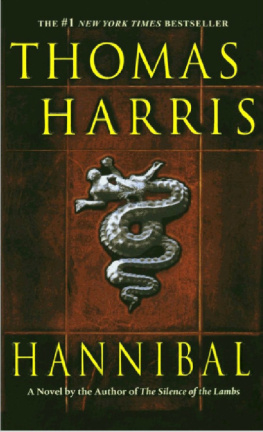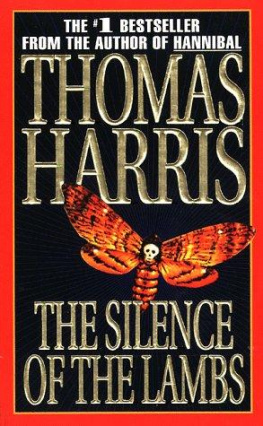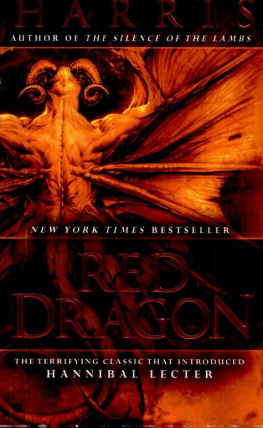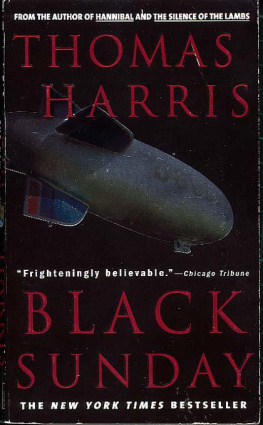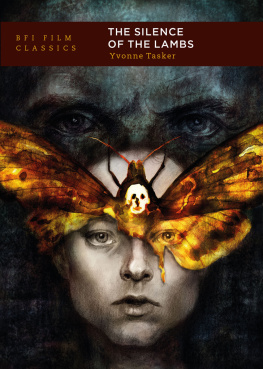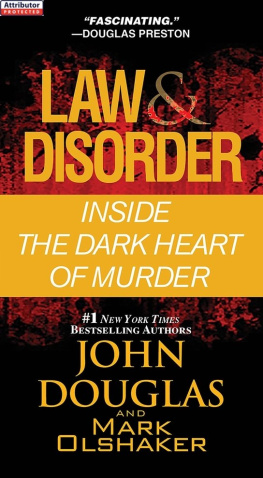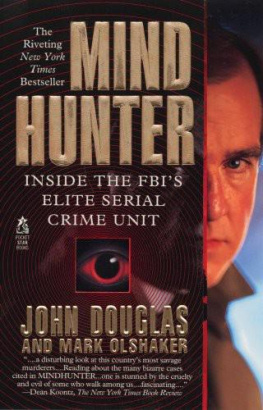
Thomas Harris
The Silence of the Lambs
The second book in the Hannibal Lecter series
To the memory of my father.
If after the manner of men I have fought with beasts at Ephesus, what advantage hit me, if the dead rise not?
Corinthians
Need I look upon a death's head in a ring, that have one in my face?
John Donne, "Devotions"
Behavioral Science, the FBI section that deals with serial murder, is on the bottom floor of the Academy building at Quantico, half-buried in the earth. Clarice Starling reached it flushed after a fast walk from Hogan's Alley on the firing range. She had grass in her hair and grass stains on her FBI Academy windbreaker from diving to the ground under fire in an arrest problem on the range.
No one was in the outer office, so she fluffed briefly by her reflection in the glass doors. She knew she could look all right without primping. Her hands smelled of gunsmoke, but there was no time to wash-- Section Chief Crawford's summons had said now.
She found Jack Crawford alone in the cluttered suite of offices. He was standing at someone else's desk talking on the telephone and she had a chance to look him over for the first time in a year. What she saw disturbed her.
Normally, Crawford looked like a fit, middle-aged engineer who might have paid his way through college playing baseball-- a crafty catcher, tough when he blocked the plate. Now he was thin, his shirt collar was too big, and he had dark puffs under his reddened eyes. Everyone who could read the papers knew Behavioral Science section was catching hell. Starling hoped Crawford wasn't on the juice. That seemed most unlikely here.
Crawford ended his telephone conversation with a sharp "No." He took her file from under his arm and opened it.
"Starling, Clarice M., good morning," he said.
"Hello." Her smile was only polite.
"Nothing's wrong. I hope the call didn't spook you."
"No." Not totally true, Starling thought.
"Your instructors tell me you're doing well, top quarter of the class."
"I hope so, they haven't posted anything."
"I ask them from time to time."
That surprised Starling; she had written Crawford off as a two-faced recruiting sergeant son of a bitch.
She had met Special Agent Crawford when he was a guest lecturer at the University of Virginia. The quality of his criminology seminars was a factor in her coming to the Bureau. She wrote him a note when she qualified for the Academy, but he never replied, and for the three months she had been a trainee at Quantico, he had ignored her.
Starling came from people who do not ask for favors or press for friendship, but she was puzzled and regretful at Crawford's behavior. Now, in his presence, she liked him again, she was sorry to note.
Clearly something was wrong with him. There was a peculiar cleverness in Crawford, aside from his intelligence, and Starling had first noticed it in his color sense and the textures of his clothing, even within the FBI-clone standards of agent dress. Now he was neat but drab, as though he were molting.
"A job came up and I thought about you," he said. "It's not really a job, it's more of an interesting errand. Push Berry 's stuff off that chair and sit down. You put down here that you want to come directly to Behavioral Science when you get through with the Academy."
"I do."
"You have a lot of forensics, but no law enforcement background. We look for six years, minimum."
"My father was a marshal, I know the life."
Crawford smiled a little. "What you do have is a double major in psychology and criminology, and how many summers working in a mental health center-- two?"
"Two."
"Your counselor's license, is it current?"
"It's good for two more years. I got it before you had the seminar at UVA-- before I decided to do this."
"You got stuck in the hiring freeze."
Starling nodded. "I was lucky though-- I found out in time to qualify as a Forensic Fellow. Then I could work in the lab until the Academy had an opening."
"You wrote to me about coming here, didn't you, and I don't think I answered-- I know I didn't. I should have."
"You've had plenty else to do."
"Do you know about VI-CAP?"
"I know it's the Violent Criminal Apprehension Program. The Law Enforcement Bulletin says you're working on a database, but you aren't operational yet."
Crawford nodded. "We've developed a questionnaire. It applies to all the known serial murderers in modern times." He handed her a thick sheaf of papers in a flimsy binding. "There's a section for investigators, and one for surviving victims, if any. The blue is for the killer to answer if he will, and the pink is a series of questions an examiner asks the killer, getting his reactions as well as his answers. It's a lot of paperwork."
Paperwork. Clarice Starling's self-interest snuffled ahead like a keen beagle. She smelled a job offer coming-- probably the drudgery of feeding raw data into a new computer system. It was tempting to get into Behavioral Science in any capacity she could, but she knew what happens to a woman if she's ever pegged as a secretary-- it sticks until the end of time. A choice was coming, and she wanted to choose well.
Crawford was waiting for something-- he must have asked her a question. Starling had to scramble to recall it.
"What tests have you given? Minnesota Multiphasic, ever? Rorschach?"
"Yes, MMPI, never Rorschach," she said. "I've done Thematic Apperception and I've given children Bender-Gestalt."
"Do you spook easily, Starling?"
"Not yet."
"See, we've tried to interview and examine all the thirty-two known serial murderers we have in custody, to build up a database for psychological profiling is unsolved cases. Most of them went along with it-- I think they're driven to show off, a lot of them. Twenty-seven were willing to cooperate. Four on death row with appeals pending clammed up, understandably. But the one we want the most, we haven't been able to get. I want you to go after him tomorrow in the asylum."
Clarice Starling felt a glad knocking in her chest and some apprehension too.
"Who's the subject?"
"The psychiatrist-- Dr. Hannibal Lecter," Crawford said.
A brief silence follows the name, always, in any civilized gathering.
Starling looked at Crawford steadily, but she was too still. " Hannibal the Cannibal," she said.
"Yes."
"Yes, well-- Okay, right. I'm glad of the chance, but you have to know I'm wondering-- why me?"
"Mainly because you're available," Crawford said. "I don't expect him to cooperate. He's already refused, but it was through an intermediary-- the director of the hospital. I have to be able to say our qualified examiner went to him and asked him personally. There are reasons that don't concern you. I don't have anybody left in this section to do it."
"You're jammed-- Buffalo Bill-- and the things in Nevada," Starling said.
"You got it. It's the old story-- not enough warm bodies."
"You said tomorrow-- you're in a hurry. Any bearing on a current case?"
"No. I wish there were."
"If he balks on me, do you still want a psychological evaluation?"
"No. I'm waist-deep in inaccessible-patient evaluations of Dr. Lecter and they're all different."
Crawford shook two vitamin C tablets into his palm, and mixed an Alka-Seltzer at the water cooler to wash them down. "It's ridiculous, you know; Lecter's a psychiatrist and he writes for the psychiatric journals himself-- extraordinary stuff-- but it's never about his own little anomalies. He pretended to go along with the hospital director, Chilton, once in some tests-- sitting around with a blood-pressure cuff on his penis, looking at wreck pictures-- then Lecter published first what he'd learned about Chilton and made a fool out of him. He responds to serious correspondence from psychiatric students in fields unrelated to his case, and that's all he does. If he won't talk to you, I just want straight reporting. How does he look, how does his cell look, what's he doing. Local color, so to speak. Watch out for the press going in and coming out. Not the real press, the supermarket press. They love Lecter even better than Prince Andrew."
Next page

